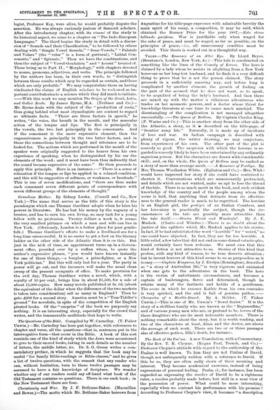Tai.xs.—The Romance of an Alter Ego. By Lloyd Bryce. (Brentano's,
London, New York, (Lc.) —This tale is constructed on something like the lines of the Comedy of Errors. The hero is claimed by a lady whom be assists in alighting from a New York horse-car as her long-lost husband, and he finds it a very difficult thing to prove that he is not the person claimed. The story proceeds in a sufficiently amusing way, and before long is complicated by another element, the growth of feeling on the part of the accused that he does not want, so to speak, to be acquitted of being the lady's husband. And then there are mixed up with the matter a villainous adventuress who trades on her mesmeric powers, and a doctor whose thirst for knowledge threatens at one time to cause much mischief. The disentangling of the complication is not managed altogether successfully. —The Queen of Bedlam. By Captain Charles King. (F. Warne and Co.)—This is another story from the other side of the Atlantic, a story, as it is described on the title-page, of "frontier army life." Naturally, it is made up of incidents of love and war. An Indian campaign is described with plenty of vigour, the writer drawing, we may conjecture, from experiences of his own. The other part of the plot is scarcely as good. The suspicion with which the heroine is re- garded is scarcely likely to have been entertained by any ordinarily sagacious person. But the characters are drawn with considerable skill ; and, on the wh,Ae, The Queen of Bedlam may be ranked as a story of more than average merit.—A R,omance of Posileipo. By Mrs. Thomas Woollaston White. (Eglinton and Co.)—Mrs. Whit.) would have improved her story if she could have contrived to shorten it. Conversations which are unnecessarily protracted, and details which are not wanted, make us apt to lose the thread of the tale. There is so much merit in the book, and such evident knowledge of the country and of the people among whom the scene is laid, that anything that detracts from its effective- ness to the general reader is much to be regretted. The heroine is an English girl, the protegee of an Italian Countess, and her love-story is practically the subject, though the cir- cumstances of the tale are possibly more attractive than the tale itself. —Stories Weird and Wonderful. By J. E. Mudock. (Chatto and Windus.)—There is no doubt about the justice of the epithets which Mr. Mudock applies to his stories. In fact, if he had substituted the word " horrible " for "weird," no one could have objected. In fact, they are far too horrible. A little relief, a few tales that did not end in some dismal catastrophe, would certainly have been welcome. We must own that this kind of fiction is not attractive to us. Stories of this kind that profess, with any kind of reason, to be true deserve attention ; but to invent horrors of this kind seems to us as purposeless as it is easy.—Captain Kangaroo, by J. Evelyn (Remington), described as "a story of Australian life," is very vigorous and animated when one gets to the adventures in the bush. The hero is the victim of unfortunate circumstances, and becomes a captain of bushrangers, fierce and determined, though he retains many of the instincts and habits of a gentleman. The scene in which he rescues Kathie from his own comrades is very spirited, and the end is full of genuine pathos.— Chronicles of a Wealth-Resort. By A. Helder. (T. Fisher Unwin.)—This is one of Mr. Unwin's "Novel Series." It is the story of a shiftless family who are known as the "Ragamuffins," and of various young men who are, or pretend to be, lovers of the three daughters who are its most noticeable members. There is nothing remarkable about the story, but it is worth reading, and two of the characters at least, Alma and the doctor, are above the average of such work. There are two or or three passages also of effective pallets, Ella's death, for instance.


















































 Previous page
Previous page